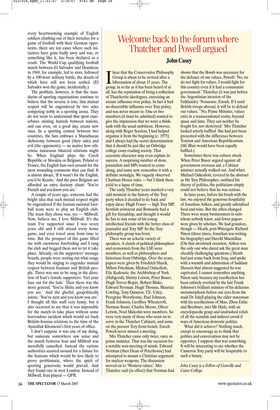Welcome back to the forum where Thatcher and Powell argued
John Casey
Ihear that the Conservative Philosophy Group is about to be revived after a hibernation of about 15 years. The group, in so far as it has been heard of at all, has the reputation of being a collection of Thatcherite ideologues, exercising an arcane influence over policy. In fact it had no discernible influence over Tory policy, and was never meant to. One or two members (it must be admitted) wanted to give the impression that we were a thinktank with the usual ambitions. However, along with Roger Scruton, I had helped organise it from the beginning (c. 1975) and I always had the secret determination that it should be just like an Oxbridge college essay-reading society. That eccentric character may even explain its success. A surprising number of dons, journalists and MPs wanted to come along, and some now remember it with a definite nostalgia. We vaguely observed Chatham House rules — but I think these yield to a lapse of time.
The early Thatcher years marked a very odd moment in the history of the Tory party when it decided to lie back and enjoy ideas. Hugh Fraser — high Tory MP, Scottish aristocrat and Romantic had a gift for friendship, and thought it would be fun to mix some of his young intellectual friends with the better class of journalist and Tory MP. So the Tory philosophy group was born.
There was an eclectic variety of speakers. A clutch of political philosophers and economists from the LSE were members, as well as philosophers and historians from Oxbridge. Over the years, papers were given by Friedrich Hayek, Milton Friedman, Michael Oakeshott, Elie Kedourie, the Archbishop of York (Habgood), Shirley Letwin, Peter Bauer, Hugh Trevor-Roper, Robert Blake, Edward Norman. Hugh Thomas, Maurice Cowling, Tony Quinton, T.E. Utley, Peregrine Worsthorne, Paul Johnson, Frank Johnson, Geoffrey Wheatcroft, Norman Stone, Charles Moore, Oliver Letwin, Noel Malcolm were members. So were very many of those who went on to serve in the Thatcher Cabinets, and some on the present Tory front-bench. Enoch Powell never missed a meeting.
Mrs Thatcher came only twice, once as prime minister. That was the occasion for a notable non-meeting of minds. Edward Norman (then Dean of Peterhouse) had attempted to mount a Christian argument for nuclear weapons. The discussion moved on to ‘Western values’. Mrs Thatcher said (in effect) that Norman had shown that the Bomb was necessary for the defence of our values. Powell: ‘No, we do not fight for values. I would fight for this country even if it had a communist government.’ Thatcher (it was just before the Argentinian invasion of the Falklands): ‘Nonsense, Enoch. If I send British troops abroad, it will be to defend our values.’ ‘No, Prime Minister, values exist in a transcendental realm, beyond space and time. They can neither be fought for, nor destroyed.’ Mrs Thatcher looked utterly baffled. She had just been presented with the difference between Toryism and American Republicanism. (Mr Blair would have been equally baffled.) Sometimes there was culture shock. When Peter Bauer argued against all government overseas aid, a Cabinet minister actually walked out. And when Michael Oakeshott, revered in the abstract as Mr Tory Philosopher, outlined his theory of politics, the politicians simply could not believe that he was serious.
In later years, before his brush with the law, we enjoyed the generous hospitality of Jonathan Aitken, and greatly subsidised food and wine. But the ethos changed. There were many businessmen in suits whom nobody knew, and fewer papers were given by scholars. We had grandees, though — Heath, post-Watergate Richard Nixon (three times, Jonathan was writing his biography) and Harold Macmillan. (On that awestruck occasion, Aitken was the only one who dared ask the great man cheekily challenging questions.) Heath had just come back from Iraq, and spoke with a warmth and admiration of Saddam Hussein that almost suggested he was captivated. I cannot remember anything Nixon said, because my recollection has been entirely overlaid by the late Frank Johnson’s brilliant mimicry of his delicious metamorphosis before our eyes from the staid Dr Jekyll playing the elder statesman with his recollections of Mao, Zhou Enlai and Brezhnev, into Mr Hyde, with an encyclopaedic grasp and unabashed relish of all the scandals and indirect crook’d ways of American domestic politics.
What did it achieve? Nothing much, except to encourage us to think that politics and conversation may not be opposites. I suppose that was something. It will be interesting to see whether the Cameron Tory party will be hospitable to such a luxury.


































































































 Previous page
Previous page